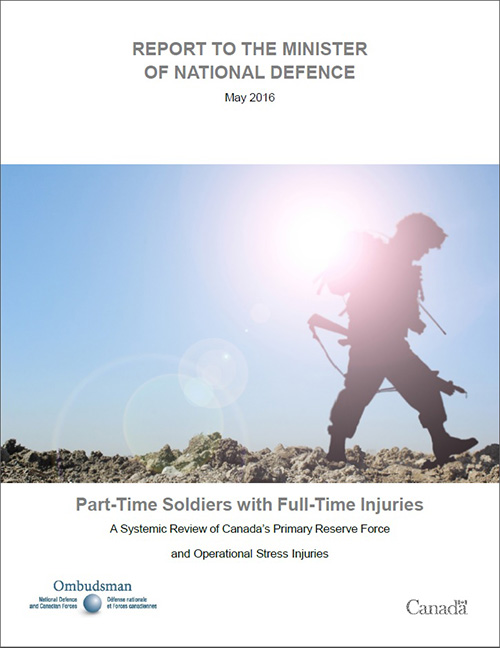Part-Time Soldiers with Full-Time Injuries: A Systemic Review of Canada’s Primary Reserve Force and Operational Stress Injuries
May 2016
Since 2002, the Office has been tracking the issue of operational stress injuries and the adequacy of the health care provided to members of the Canadian Armed Forces.
Progress report on the status of recommendations
October 2022
- 3 Recommendations Made
- 3 Recommendations Accepted
- 2 Recommendations Partially Implemented
- 1 Recommendation Not Implemented
Recommendation 1
It is recommended that the Department of National Defence and the Canadian Armed Forces improve the clarity and administration of Reservists’ entitlement and eligibility for health care, periodic health assessments and future Reserve employment by:
1.1 Completing the revision of Queen’s Regulations and Orders, Chapter 34 – “Medical Services,” that has been under review since 2009, to clearly identify all entitlements to care for all Reservists
1.2 Incorporating the requirement for Reservists to undergo routine periodic health assessments (or to have their medical readiness determined) into the revised Queen’s Regulations and Orders Chapter 34 – “Medical Services” (along with associated policies and directives). Once this requirement is codified, ensure that the appropriate resources are in place to guarantee Reserve medical readiness
1.3 Confirming in Canadian Forces Military Personnel Instruction 20/04 that Reservists whose Medical Employment Limitations so allow may be eligible to obtain new employment despite the existence of a temporary medical category
Recommendation 1 status: Accepted Not implemented
The Queen’s Regulations and Orders, Chapter 34 – Medical Services – is still under review. Due to the length of time required to update a Queen’s Regulations and Orders, and the level of review and approval required, the Canadian Armed Forces is exploring the feasibility of using a Ministerial Directive as an interim measure. Canadian Forces Military Personnel Instruction 20/04 is under review and amendments have been drafted. As of spring, 2022, the target date for approval is currently spring 2023.
Recommendation 2
It is recommended that the Department of National Defence and the Canadian Armed Forces take measurable steps to improve the knowledge and awareness of the entitlements available to all Reservists, especially those who may be ill and injured, by:
2.1 Making any relevant documents, policies, procedures and forms easily accessible on the internet and on the Defence Information Network, and ensuring this information remains current
2.2 Committing the resources required for the development and implementation of a communications plan. This would include activities, products, timelines and metrics to reach and inform Reservists
2.3 Ensuring that training on entitlement to health care (currently provided by the Field Ambulance Medical Link Teams) is effective and mandatorily provided to Reserve units
2.4 Ensuring that Reserve units have the appropriate number of training days to provide mandatory training to their members, and that such training is completed
Recommendation 2 status: Accepted Partially implemented
The Military Benefits Browser and various education products developed by our Office address the gap in information available online. Linked content is updated ad hoc, and hyperlinks are updated monthly. The DND/CAF FAQs will be reviewed prior to Fall 2022 and will be updated annually thereafter. A communications plan has been approved; however, a draft is not yet available. The Canadian Armed Forces has not taken any concrete steps to ensure that mandatory training on health care entitlements is provided to Reserve units.
Recommendation 3
It is recommended that the Department of National Defence and the Canadian Armed Forces strengthen the responsibility and capacity to follow-up with Reservists by:
3.1 Establishing a consistent and meaningful approach to contacting Reservists who are on non-effective strength; especially those with a deployment history, and document the efforts made to reach them, even if unsuccessful
3.2 Establishing an oversight mechanism to ensure the consistent completion of post-deployment follow-up activities at the unit level, and reiterating the responsibilities of the chain of command in this regard
3.3 Flagging to the chain of command when a Reservist is non-effective strength and cannot be reached
3.4 Ensuring that the Field Ambulance Medical Link Teams are properly resourced to effectively deliver their mandate
3.5 Taking the necessary steps to fill all established mental health positions, and reviewing the mental health staffing requirements for the 2016 paradigm
Recommendation 3 status: Accepted Partially implemented
To date, no action has been taken to strengthen the responsibility and capacity to track and monitor Reservists, including the establishment of an oversight mechanism to ensure the consistent completion of post-deployment follow-up activities at the unit level and a consistent approach to contacting Reservists who are non-effective strength. Field Ambulance Medical Link Teams no longer exist within the Canadian Armed Forces. The services and supports are being delivered by Canadian Forces Health Services Group (CFHS), Reserve Field Ambulances. No information was provided on whether CFHS Reserve Field Ambulances are being adequately resourced to deliver their mandate. The Department of National Defence and Canadian Armed Forces have reviewed mental health staffing requirements and increased the number of mental health positions and staffed the majority of established positions.
Page details
- Date modified:
